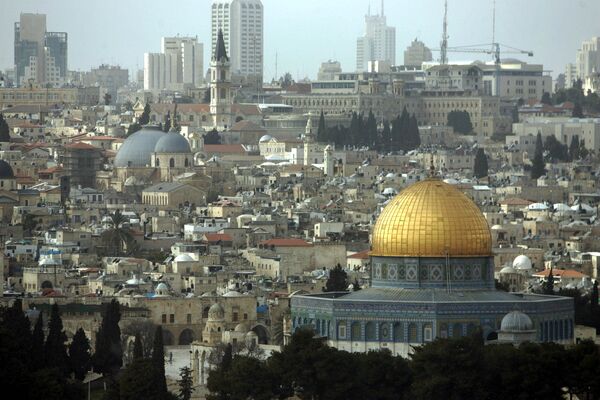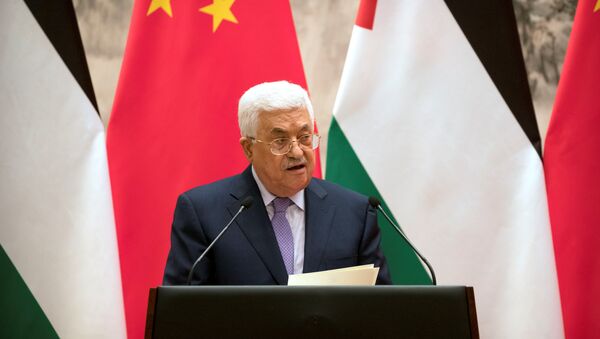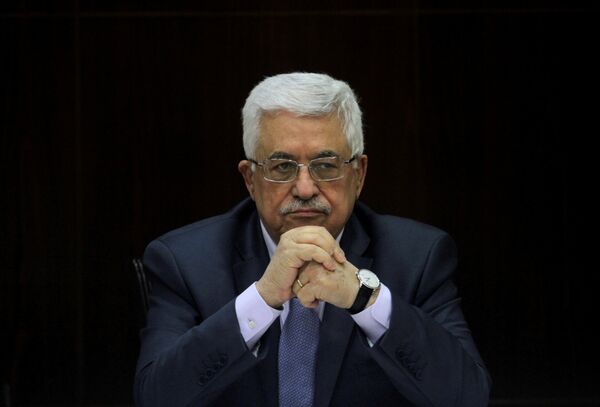Israel has denied they are preventing Mr. Abbas from leaving Ramallah, the city where the Palestinian Authority is based, to visit other parts of the West Bank.
But several incidents on the Temple Mount in July have increased tensions in the area and the Palestinian leader has been accused of reducing co-operation with Israel's security forces.
The Temple Mount, which is the third holiest site in Islam, was equipped with metal detectors and surveillance cameras after an incident on July 14 when two Israeli police officers were killed.

But the introduction of the metal detectors led to violent clashes in Palestinian neighborhoods.
Mr. Abbas and his Fatah movement are more popular in the West Bank than in the Gaza Strip, which has tended to be dominated by their Islamist rival Hamas.
But Mr. Abbas is increasingly realizing that Israel, under Mr. Netanyahu, has no intention of pushing ahead with a two-state solution, especially considering Donald Trump is now in the White House and has come down firmly on the Israeli side.
Mr. Trump's predecessor, Barack Obama, did little or nothing to support the Palestinian right to self-determination during his eight years in office, but he was not at nakedly partisan as Mr. Trump.
Mr. Abbas's spokesman Nabil Abu Rudeinah said "the leader will not leave Ramallah due to the freezing of links with Israel."
Mr. Abbas has become increasingly unpopular among ordinary Palestinians in recent months because he is seen as weak and compliant in the face of increasing Israeli aggression. He is also resented because he has imposed sanctions on Hamas-controlled Gaza.
Mr. Abbas has cut payments for electricity supplied by Israel to Gaza in a bid to force Hamas into agreeing a deal with Fatah.
Al Qaddumi meets Russian ambassador in Tehranhttps://t.co/2ZdMCt0AsX
— Hamas Movement (@HamasInfoEn) 3 August 2017
UN officials say the power cuts are punishing Gaza's two million residents, rather than Hamas.
"We will continue the gradual stopping of financial allocations to the Gaza Strip until Hamas commits to reconciliation" said Mr. Abbas on Saturday, August 5.
Cape Verde announced it will no longer vote against Israel at the UN. The decision follows my recent meeting w/ the president of Cape Verde. pic.twitter.com/Jw3YCgnZOu
— Benjamin Netanyahu (@netanyahu) 2 August 2017
"Since the coup, we have paid a billion and a half dollars to the Gaza Strip," said Mr. Abbas, referring to the 2007 ousting of Fatah by Hamas in Gaza.
Earlier in August, Salah al-Bardawil, a member of Hamas' influential political bureau, unveiled a new initiative for intra-Palestinian reconciliation, which he said was necessary due to "the voices of the Palestinian masses who revolted in Jerusalem and won the Battle of the Al-Aqsa Gates," a reference to July's Temple Mount clash.
There are increasing health concerns about Mr. Abbas, who is 82 and was treated for prostate cancer a few years ago. He has recently been diagnosed with cardiac problems and is now unable to travel to the Jordanian capital, Amman, for health checks.
— Hamas Movement (@HamasInfoEn) 1 May 2017
But he has few challengers within Fatah and his main rival, Mohammed Dahlan, who was expelled from Fatah in 2011, lives in exile in the United Arab Emirates.
Mr. Abbas recently cut short a trip to China and traveled back to Ramallah after the Israelis demanded he return to calm the tensions.
King Abdullah of Jordan is due to visit Ramallah this week, and Mr. Abbas is reportedly hopeful he will persuade the Israelis to lift the sanctions.
There have been no talks between Israel and the Palestinians for three years and although Mr. Trump visited Mr. Abbas in May and shook his hand, he said an agreement between the two sides would be "one of the toughest deals of all" to broker.



